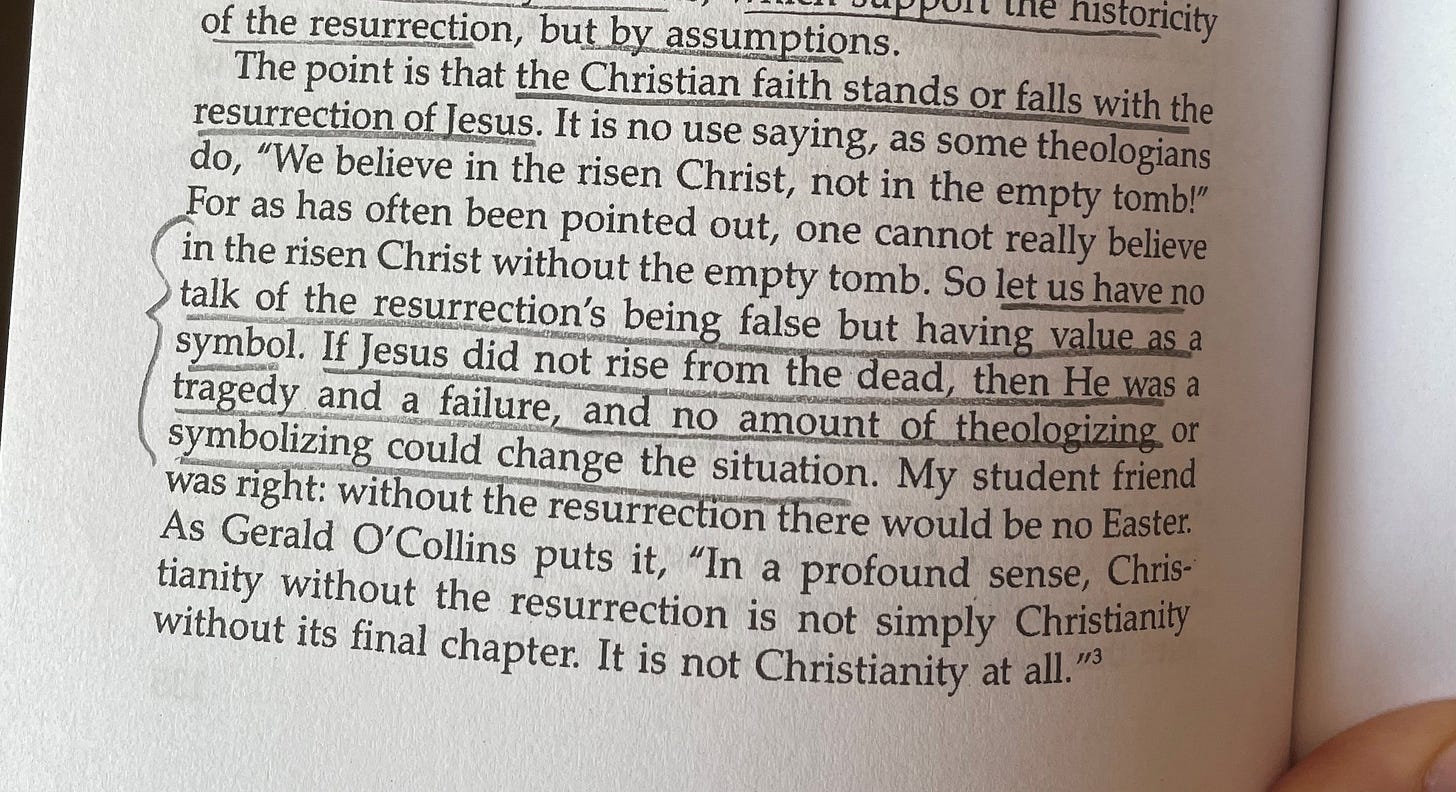Keep reading for:
The basic arguments for theism + why it’s important to be acquainted with them
An Easter & apologetics crossover
I have a confession to make: I’m a content addict.
Whether it’s a podcast, a sitcom, an fantasy novel, or a Taylor Swift album, I find it hard to tear myself away from the content that entertains and interests me, for better or for worse.
This habit came in handy during my junior year of college, when I started seeking out the answers to the questions I had previously been too afraid to ask. That year, whether I was cleaning my apartment, driving to campus, or getting ready for work, I was listening to podcasts and YouTube videos that had answers to my questions.
Call it media overconsumption if you’d like—you’d probably be justified. But that media introduced me to some of the main talking points in apologetics that have continued to shape the intellectual side of my faith today.
I’m going to introduce you to a few of the basics here, but first:
Why it matters
In Mere Christianity, C.S. Lewis admonishes readers who ignore the virtue of prudence, which he defines as “practical common sense, taking the trouble to think out what you are doing and what is likely to come of it.”1
Lewis, in his matter-of-fact way, assures readers that there will be no hiding behind the excuse that “Christ said we could only get into His world by being like children.” He clarifies, “He wants a child's heart, but a grown up's head. He wants us to be simple, single-minded, affectionate, and teachable, as good children are; but He also wants every bit of intelligence we have to be alert at its job, and in first-class fighting trim.”2
Though my faith wasn’t necessarily young when I entered college, it was certainly more childish than childlike. Emotions and personal experience had carried me for a time, but they wouldn’t sustain me much longer. It was time to fully engage my mind.
And, I came to learn something especially compelling: We have the upper hand. Philosophy, supported by findings from science, has shown time and again that the existence of God is not only possible, but likely.
The basic arguments
I’m going to dedicate more time to each of these arguments in the future, but for now I think it’s sufficient to start with a basic introduction to five of the most popular arguments for the existence of God and the truth of Christianity. Think of this as a philosophical tasting menu, meant to give you an idea of what philosophy is capable of when it comes to apologetics discussions.
1. The Cosmological Argument
The Cosmological Argument has its roots in ancient philosophy, strengthened by the discoveries of modern science. It hinges on the premise that the universe began to exist. While that may not sound like a controversial assertion—especially for people who were raised to believe that, “In the beginning, God created the heavens and the earth”—it hasn’t been until recently that science has agreed.
We know from science and personal experience that things don’t spontaneously pop into existence out of nothing. If something begins to exist, it must have a cause. Therefore, since the universe began to exist, it must have a cause. The best explanation for that cause is God—an “uncaused, timeless, immaterial, powerful Personal Creator.”3
2. The Fine-Tuning Argument
Math and physics nerds, this one’s for you. (Everyone else, stay with me here—I promise it’s not too bad.) Essentially, the Fine-Tuning Argument takes a look at all of the constants and quantities that make life on Earth possible. It’s not just that the world would be different if some of these constants and quantities were to change slightly—it would not exist.
The philosophical part of the argument says that there are three possible reasons for the universe’s fine-tuning: physical necessity, chance, or design. Since there’s no proof of physical necessity, and chance is, well, extremely unlikely, the best option is that the universe was designed. Design requires a Designer…and I think you can see where I’m going here.
3. The Moral Argument
While I appreciate the former two arguments for their interdisciplinary appeal, I have a soft spot for the simplicity and universality of the Moral Argument. This argument appeals to humanity’s general sense of right and wrong. While some points of morality may be contentious across cultures, most things are not: Humans across space and time have believed that it’s wrong to kill, for example.
As Lewis says in Mere Christianity, “Human beings, all over the earth, have this curious idea that they ought to behave in a certain way, and cannot really get rid of it.”4
But, why do we all have this sense of right and wrong? Where did it come from, and why do we typically agree? Our answer: If we are just the products of blind chance, then there’s no real reason to claim that anything we do is “right” or “wrong.” There simply must be an objective moral standard, and that standard comes from God.
4. The Problem of Evil
You’ve probably heard some version of the Problem of Evil (sometimes called the Problem of Suffering). The basic claim is that a good God cannot coexist with suffering. Therefore, since we know that there’s a great deal of suffering in the world, God can’t possibly exist…right?
Not necessarily. Philosophically, there’s no inconsistency in the existence of a good God and the existence of suffering. In fact, it makes sense that an all-knowing God could (and likely does) have good reasons to allow suffering in the world. Understand me here: This argument is not simply making light of suffering by saying, “Everything happens for a reason,” and moving forward. It only claims that the existence of suffering doesn’t rule out the possibility of God’s existence.56
5. The Resurrection of Jesus
Though I’ve always had a belief in the reality of the resurrection as a result of my Christian faith, that belief took on a whole new meaning after reading Dr. William Lane Craig’s “The Son Rises.” I don’t simply believe in the resurrection as a doctrinal obligation—I have good reasons to believe that a miraculous resurrection from the dead is the best explanation for the evidence surrounding the event.
This evidence includes things like Christ’s appearances after his death; the empty tomb, and the fact that female disciples were the first to discover it; and the origin of the Christian faith, among others. There is simply no other way to explain all of these phenomena.
Now, LMK:
Which argument do you find most compelling? What objections do you anticipate already? Have you struggled with any of these questions yourself? Leave a comment or respond to this email to get the conversation going—you might just see yourself in a later edition of Warranted.
And a recommendation:
You’ve probably heard of Lee Strobel’s book “The Case for Christ,” in which he addresses all of the evidence for the resurrection like a court case. In the talk below, he discusses his book as well as his personal journey from atheism to Christianity. There’s no better time than the Easter season to think about the resurrection, and, as a journalist, I found Strobel’s testimony particularly compelling.
“Mere Christianity,” C.S. Lewis, p. 77
Ibid.
“On Guard,” William Lane Craig, p. 104
“Mere Christianity,” C.S. Lewis, p. 8
I really appreciate the interaction between the Moral Argument and the Problem of Evil. To claim that there is evil in the world, one must concede that there are objective moral standards and values—otherwise, there would be no grounds to call anything “evil” or “good,” but rather these instances would simply be the outcome of blind chance.
It’s worth noting here that Christianity is actually extremely well-equipped to handle the Problem of Evil on a personal level. Even Christ’s atoning death on the cross, which secured humanity’s salvation from sin, was an act of extreme suffering. We’ll discuss this more in a later article, but suffice it to say that, if you still feel uncomfortable with suffering and evil (which is a very normal way to feel), there’s a lot more to say.







Objections to the historicity of the Resurrection are sure to come up. I can understand why people (me included) trust the historical sciences less (although perhaps we should hold other sciences to the same scrutiny since the methodology sections of many papers are absolute rubbish). However, the fact does remain that if we give no special treatment to the facts surrounding the resurrection and treat it the same as other historical events, then the totality of evidence would suggest that the resurrection did in fact happen. If we want to reject the conclusion, it seems there are two options: 1) cease to believe any historical events that we ourselves do not directly witness (after all, other eye witnesses could lie and videos can be faked and the voices in my head could be fake and the walls could be closing in and and oh my!), or 2) reject all historical events that cannot be explained naturalistically. Option 1 is obviously foolish and borders on some type of pseudo-liberal, revisionist dogma. One would be hard-pressed to find a scholar who holds this position, hence my sarcastic treatment. The second option seems to me to have some footing. However, there are plenty of "miraculous" events (e.g. the beginning of the universe) that cannot be explained through naturalistic causes. I actually accept this type of skepticism for historical events of which I only hold a superficial understanding. But again, the evidence surrounding the resurrection needs to be explained, and there is only one hypothesis with the necessary explanatory power to make sense of all the separate pieces of data: it actually happened.